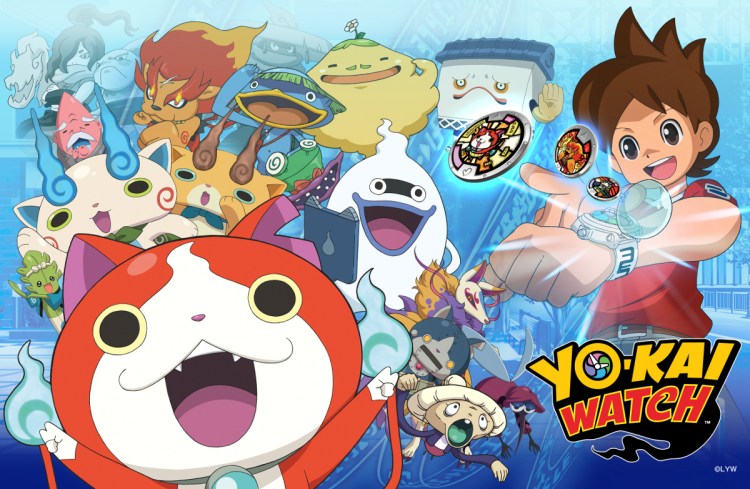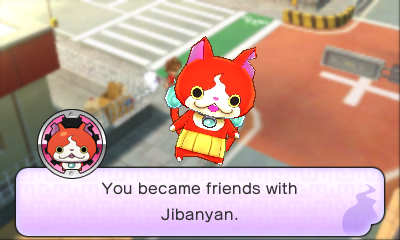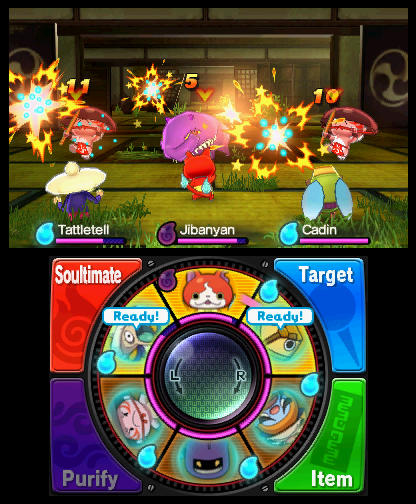It’s been a long time coming, but Japan’s Yo-Kai Watch has finally made the voyage overseas.
The series has proven to be a tremendous success in its native land, outselling long-time franchise favorite Pokémon’s latest entry and spawning aisles filled with kids’ merchandise. As Yo-Kai Watch fever cools down in Japan, however, developer Level-5 is looking to expand the property overseas with the help of Nintendo’s top-notch marketing team.
Check out our Reviews Vault for past game reviews.
While the Yo-Kai Watch marketing machine has been running beautifully in the U.S. thus far, the game — a role-playing adventure where you use the Yo-Kai watch to discover, engage with, and collect hidden creatures — doesn’t quite live up to the furor surrounding the franchise.
What you’ll like
Exploring is really fun
Yo-Kai Watch’s vibe is that hidden things are all around us, so we should enjoy looking for them. The environments of the city where it takes place are expansive, filled with interesting locales to visit and people to talk to. As you make progress, more and more areas open up for you to investigate, rewarding you by giving you even more fun things to see.
It offers a practical purpose for exploring, too: Back alleys, hidden corners, and even piles of trash and the underside of vending machines contain hidden items and Yo-Kai. Previously visited locales will constantly yield new things as time passes in the game, so taking an extra moment to check a tree or revisit a favorite place is often a good idea.
It has a whole lot of stuff to do
While the main story takes a bit of time to get moving, Yo-Kai Watch offers a huge amount of side-quests and diversions. NPCs will ask for your help with various problems, some supernatural in origin, which you’ll want to investigate and help solve with the aid of your Yo-Kai pals. Upon completing these quests, you receive items and, occasionally, new areas with things like shops and the ability to transform your Yo-Kai. And should you get tired of hunting normally unseen spirits and being an errand-runner, you can always go out collecting bugs and fish instead.
What you won’t like
Your combat role is almost entirely passive
Unlike most other “collect beasties and have ’em fight” games, your control over your Yo-kai friends is limited. Instead of directing which moves to use, the team of three Yo-kai in combat will act on their own based on algorithms related to their personalities. Your role is more like a coach in the background, directing which enemy to target and giving restorative items when needed — the only active role you take when directing Yo-kai to use their powerful “Soultimate” attacks and “purifying” then when they get hit with status conditions in simplistic mini-games. It sounds neat in theory, but when you’re constantly losing tough fights because your friends are loafing around instead of using effective attack and healing techniques, you’ll really wish you could issue direct commands.
Adding new party members is an ordeal
If you fight enemy Yo-Kai under normal circumstances, they will rarely be available to recruit to your team when combat ends. To better the odds of them joining your cause, you’ll want to use their favorite food item on them during the fight. This has a couple of problems: You have no idea what their favorite food is, and you can only give them a snack once per fight. This makes the process an annoying string of trial-and-error encounters where you slowly exhaust your supply of food products until you find what’s right. Even if you do use the correct treat, they’re not guaranteed to join you, adding another layer of frustration.
The localization feels like a series of strange compromises
The concept of yokai spirits and monsters is deeply rooted in thousands of years of Japanese mythology, and trying to introduce it to mainstream Western audiences is a challenge. But Yo-kai Watch’s way of handling things feels messy. Despite the town and its various locales having very American-style names, it’s still filled with things like temples, public bathhouses, and cars that conspicuously drive on the left side of the street, making it feel like a half-hearted attempt to disguise something foreign. The how and why of these creatures’ existence isn’t really explained, either: While Japanese children grow up with stories about yokai creatures that cause mischief, the concepts don’t really have an exact analog in Western ideas. It takes awareness of yokai for granted, not bothering to give more context to the behavior of these beings. The weaker parts of the localization contrast sharply with the in-game dialogue, which is snappy and generally well written.
Conclusion
Yo-Kai Watch is a rather odd beast in many ways. Kids’ trends are always difficult to predict, and even with the massive marketing push behind the game, it’s hard to say if Yo-Kai Watch will achieve Pokémon-like levels of cross-cultural penetration. It certainly isn’t up to Pokémon’s level: while exploring is fun, combat is a passive, frustrating slog that keeps it from being as enjoyable as it should be.
Perhaps younger players will find more appeal in the fighting, but in terms of being strong enough to carry a global brand, the core game of Yo-Kai Watch still needs improvement.
Score: 65/100
Yo-kai Watch is out for the Nintendo 3DS on November 6. The publisher provided GamesBeat with a copy of the game for the purposes of this review.
VentureBeat's mission is to be a digital town square for technical decision-makers to gain knowledge about transformative enterprise technology and transact. Learn More




